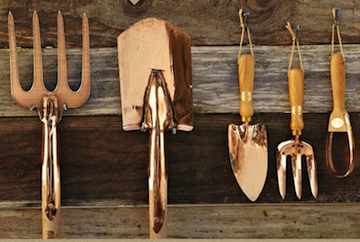
Urban homesteading, growing or raising a portion of your own food, has become so fashionable that upscale cookware company Williams-Sonoma introduced the Agrarian collection, a line of tools and supplies for activities ranging from beekeeping to cheese making, delivered to 75 countries.
Photos of gardening beds thick with leafy greens, heirloom chickens strutting around picturesque coops and shiitake mushrooms growing on a log make the homesteading life look beautiful and delicious, while also playing down the hard-work aspect of these chores-turned-hobbies. Copper gardening tools are so shiny and pretty they seem more like rustic decorations for a farm-to-table restaurant than tools for working in the dirt.
Will $700 chicken coops become the new status symbol for the upper-class foodie who owns a Viking range but eats takeout every night? Maybe so, but that’s not necessarily a bad thing for the local food movement.
“I think it is a good sign for urban homesteading,” said Julie Butcher Pezzino, executive director of Grow Pittsburgh, a nonprofit which promotes and supports urban agriculture. “It moves urban homesteading more into the mainstream,” she said, which might encourage more people to think about where their food comes from and to see that they can do some of these things themselves.
Some people do grow vegetables or raise chickens to save money. It’s no coincidence that urban homesteading gained literal ground during the Great Recession. With skill and luck, growing vegetables, raising chickens and preserving food to minimize waste can offer a cheaper alternative to, say, buying heirloom tomatoes and free- range eggs from the local farmer’s market.
Even at its most frugal, however, these urban homesteading activities cost money.
Still having control of even a very small part of the food supply is incredibly satisfying. For some that might mean raising chickens; others might try making ricotta or fermenting sauerkraut. Buying an $80 fermentation crock fromWilliams-Sonoma isn’t the cheapest way to try out a new technique, but it’s not an extraordinary splurge either. Fancy pickled vegetables often cost more than $10 a jar.
It typically costs about $2,500 outfitting a new community garden with 15 12-by-3-foot cedar wood raised beds, filled with a mix of dirt and compost. At Williams-Sonoma, a three foot square raised bed (without the dirt) costs $150, but it comes as an easy-to-assemble kit delivered to your door. For someone who loves to garden but has trouble with all the bending and stooping, there’s the option of a raised bed on stilts ($300 for a 2-by-4-foot bed on 3-foot legs), or, a cheaper solution, a memory-foam kneeling pad with a neoprene cover that wipes clean ($30).
The Agrarian collection includes an attractive wooden beehive with a copper-colored aluminum roof ($340) and a backyard beehive starter kit that includes a hat with a veil, gloves, a smoker and other equipment ($180). Beekeeping gear and chicken coops stand out from the other items that Williams-Sonoma sells, because of the commitment they represent to actual bees and chickens. Williams-Sonoma doesn’t sell either, but they do provide information about where to get them, as well as reminding people to check local ordinances before diving into small animal husbandry.
For now, only eight Williams-Sonoma stores will carry items from the Agarian collection. Browse the collection online at www.williams– sonoma.com.